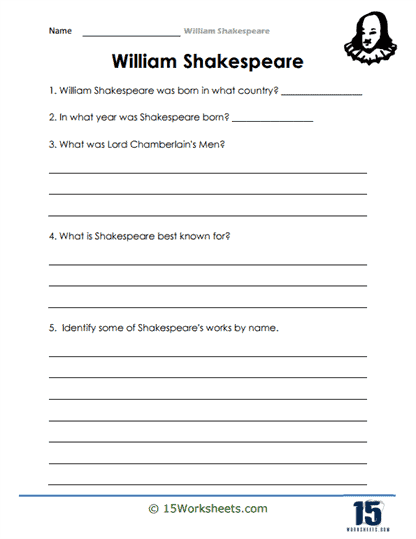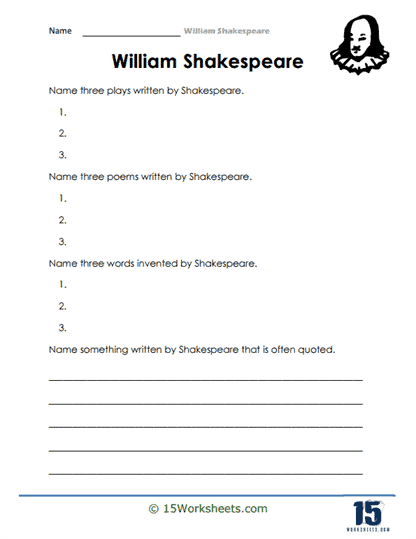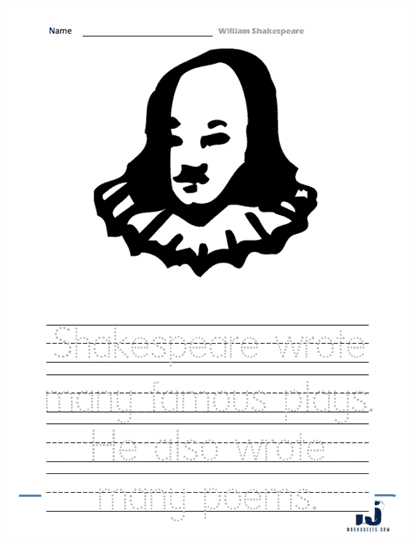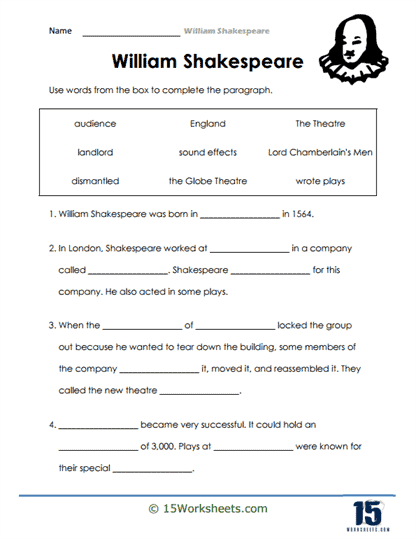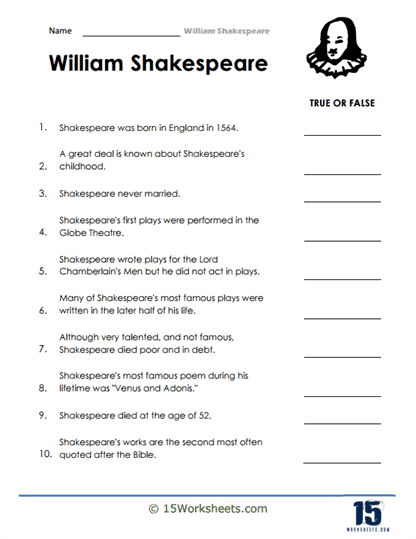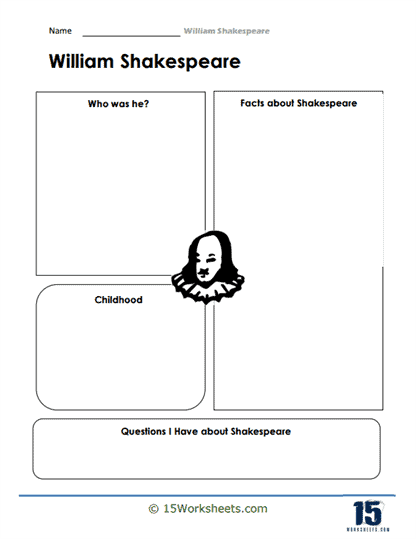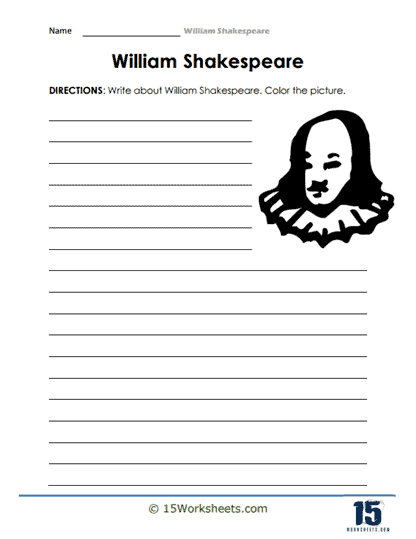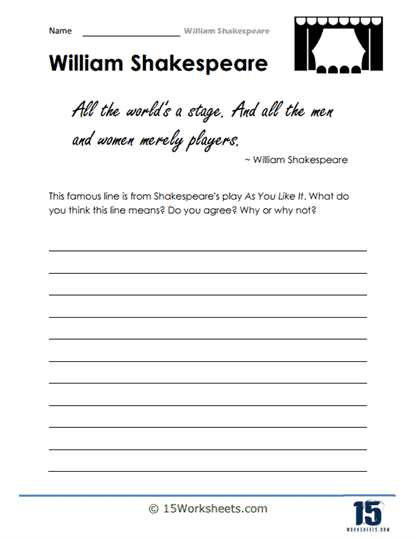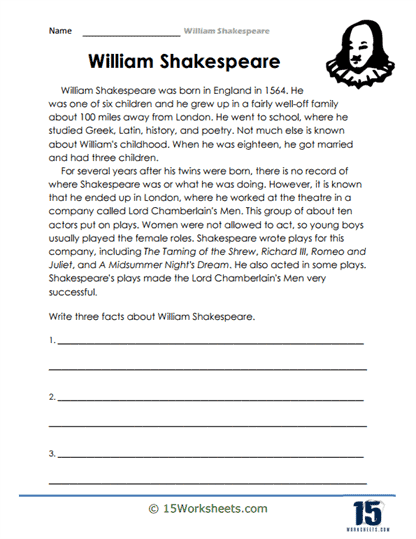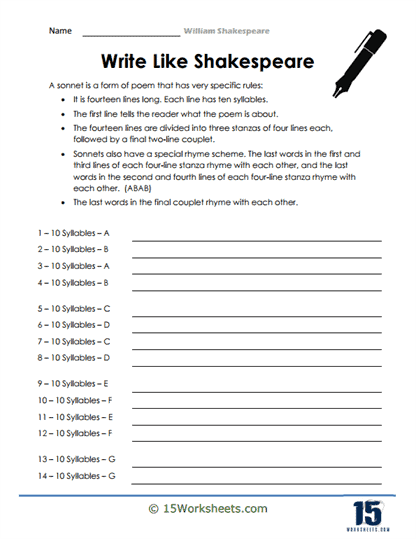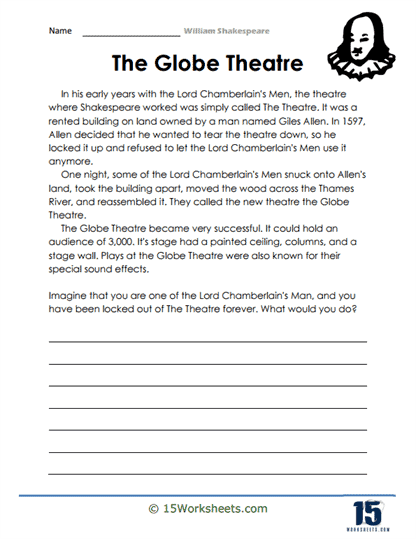William Shakespeare Worksheets
All About These 15 Worksheets
This collection of William Shakespeare worksheets is a comprehensive and engaging resource designed to introduce students to the life, works, and enduring legacy of William Shakespeare, one of the most celebrated playwrights and poets in literary history. These worksheets offer a multi-faceted exploration of Shakespeare’s contributions to literature, language, and culture, making it an invaluable tool for educators seeking to inspire a deep appreciation for the Bard’s genius.
The Importance of Studying William Shakespeare
Studying William Shakespeare is not merely an academic exercise; it is a journey into the heart of human creativity, expression, and the enduring power of language. The importance of this topic is underscored by several compelling reasons:
- Literary Significance: Shakespeare’s works are foundational to the Western literary canon, serving as a source of inspiration for countless writers and playwrights across centuries.
- Language Mastery: Exploring Shakespearean language and wordplay enhances students’ vocabulary, linguistic skills, and an appreciation for the richness of the English language.
- Cultural Understanding: Shakespeare’s works offer insight into the societal norms, values, and concerns of Elizabethan England, fostering cultural awareness and historical literacy.
- Universal Themes: Shakespeare’s exploration of timeless themes such as love, power, jealousy, and ambition allows students to connect with the human experience across time and cultures.
- Critical Thinking: Analyzing Shakespeare’s complex characters, intricate plots, and poetic devices sharpens students’ critical thinking skills and literary analysis abilities.
- Theatrical Arts: Understanding Shakespeare’s influence on theater and performance arts enriches students’ appreciation for drama, acting, and storytelling.
- Global Impact: Shakespeare’s works have been translated into numerous languages and performed worldwide, highlighting their global significance and cultural impact.
This collection of worksheets is an essential resource that equips educators to introduce William Shakespeare’s timeless works to students in a meaningful and engaging way. By delving into the life, language, and literary achievements of the Bard, students not only gain a deeper appreciation for literature and theater but also develop critical thinking skills, cultural awareness, and an enduring love for the power of words. This collection empowers educators to guide students on a transformative journey through the world of Shakespeare, inspiring a lifelong passion for literature and the arts.
Who Was William Shakespeare?
William Shakespeare (1564-1616) was an English playwright, poet, and actor, widely regarded as one of the greatest and most influential writers in the English language and world literature. Born in Stratford-upon-Avon, England, Shakespeare is often called the “Bard of Avon” and is known for his extensive body of work, which includes 39 plays, 154 sonnets, and several narrative poems.
Shakespeare’s plays encompass a wide range of genres, including tragedies, comedies, histories, and romances. Some of his most famous plays include “Romeo and Juliet,” “Hamlet,” “Macbeth,” “Othello,” “King Lear,” “A Midsummer Night’s Dream,” “The Merchant of Venice,” and “Much Ado About Nothing.” His plays have been translated into every major living language and continue to be performed and studied worldwide.
Shakespeare’s writing is celebrated for its rich language, complex characters, intricate plots, and profound exploration of themes such as love, jealousy, power, ambition, betrayal, and the human condition. His works have had a profound impact on literature, theater, and the English language, with countless phrases and expressions from his plays now ingrained in everyday speech.
Although much of Shakespeare’s life remains a mystery, it is known that he married Anne Hathaway in 1582, with whom he had three children. By the early 1590s, Shakespeare had moved to London and started working as an actor and playwright. He became a shareholder and leading member of the Lord Chamberlain’s Men, a prominent theater company that later became the King’s Men under the patronage of King James I.
Shakespeare’s plays were initially performed at various venues in London, including the Theatre, the Curtain, and the famous Globe Theatre, which was built by the Lord Chamberlain’s Men in 1599. The Globe Theatre is still a significant landmark and popular tourist attraction today, with a reconstructed version offering performances of Shakespeare’s plays.
William Shakespeare died in 1616, but his work continues to captivate audiences and inspire new generations of writers, scholars, and performers. His enduring legacy has made him an icon of English literature and a symbol of the transformative power of art and the human imagination.

